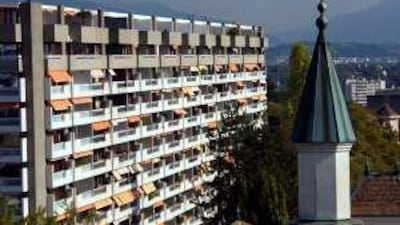Citizens in Switzerland’s second largest city approved Sunday a controversial law that bans public officials and politicians from wearing religious symbols in the workplace, amid criticism of the Islamophobic undertones of the measure.
The newly-approved “secularism law”, which was backed by over 55 per cent of the population in the Geneva Canton, has left the community highly polarised.
The measure was the product of a debate on the relationship between religion and the state that has raged for five years.
The right-leaning cantonal parliament in Geneva championed the law under the token that it will help define the limits to religious expression in the public sphere and protect the religious freedom of believers and non-believers alike.
“This law guarantees the neutrality of the state in religious matters,” Liberal politician Pierre Maudet told local media in the aftermath of the vote, adding that this would contribute to increase “social cohesion.”
Cohesion, however, seems distant. Right-wing parties and the church have backed the reform while the left and trades unions, as well as Muslim and feminist organisations, opposed it.
Some exponents of left-wing political parties criticised their own parties' approach to the secularist debate, saying that boiling down the discussion to the hijab has brought about an emotional negative reaction on the part of Swiss voters.
Critics say the law – which will extend a ban on visible religious symbols that already applies to public school teachers – will have a discriminatory effect on Muslim women who wear a headscarf. "I hope the courts will strike this down, given this law goes against the Swiss Constitution and of the European Convention on Human Rights," said Sabine Tiguemounine, a Green Party councillor who is the only elected representative in the canton to wear a head covering.
Other representatives warned the referendum would impose difficult choices on state-run institutions.
Carole-Anne Kast, a municipal official warned that some five staff on her payroll would be laid-off as a result. "These are women who help children to get to school, or take care of children after school hours,” she said. “What should I tell parents then?”
However there were also concerns the issue was being inflamed by special interest groups to raise their profile.
The director of the Islamic Centre in Geneva, Hani Ramadan said warned that secularism was reconcilable with the provisions of the Swiss constitution.
“’In the name of God Almighty,’ this is the expression that appears not in the introduction of a chapter on the Sharia but in the introduction to our Swiss constitution. Switzerland in its entirety is cannot be reduced to the secularism that is rife in Geneva… just like Islam cannot be brought back to a lifestyle that is purely secularist,” Mr Ramadan wrote on Le Temps.
Mr Ramadan – who is the grandson of the founder of the controversial Muslim Brotherhood and the brother of Tariq Ramadan, an Islamic scholar who is currently facing sexual assault charges – is himself a controversial figure.
His assets were frozen by the French government for over six months last year as part of a crackdown against people “facilitating, financing or inciting terrorism”.
Mr Ramadan’s name was one of 16 on a list of foreign nationals sentenced for or suspected of having links to a terrorist organisation. In 2017 he was barred from France and escorted to the Swiss border.
The debate on the relationship between the religious and the state has been brought back to the forefront in a number of European countries following the surge in migrant arrivals in 2011.
Switzerland is a secular state in which state and religion are in principle separated but where religion is not totally banned from public law. The state acknowledges a privileged status to different important religious communities and, to a certain extent, cooperates with them.
The emergence of non-Western religious communities rekindled the debate over whether the focus of the state policy is the laity of the state or religious neutrality and triggered a number of votes that critics say directly targeted the liberties of Muslim communities.
In 2009, a successful popular initiative against the construction of minarets was approved by over 57 per cent of the electorate in the French-speaking part of Switzerland. Last year, the Swiss senate rejected a motion calling for the foreign funding of mosques in the country to be banned. The idea of a nationwide ban on face veils was shot down in a German-speaking canton but approved in an Italian one.
Swiss citizens vote in referendums up to four times a year on around 15 federal proposals as part of the country’s notorious direct democratic system where supreme sovereignty resides with the people.

